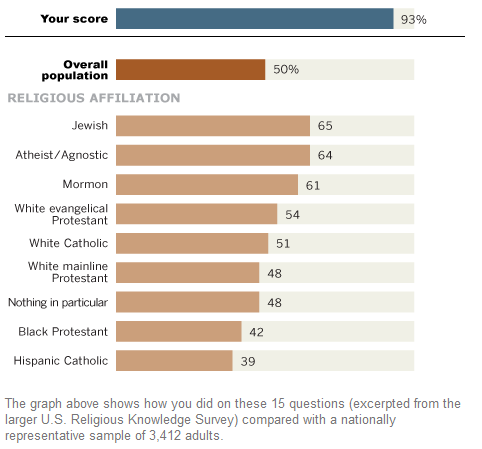What expression of style could be more violent than religion?
According to our friends at the Pew Forum on Religion & Public Life, about six in ten adults in the US consider religion to be “very important” in their lives. This fraction is far larger than the comparable statistic in (other?) developed countries. The punchline, though, is that adults in the US don’t actually know anything about religion. Not only haven’t they a clue about comparative religion— they don’t even know the basics of their own faiths. 45% of American Catholics, for example, don’t know that the wine and bread are supposed to turn into the flesh and blood of Christ when they eat it. (Footnote on “transubstantiation”, so called by the Church. Have you noticed how disgusting things always get Latinized? Presumably this is a sort of rhetorical equivalent to donning Latex gloves.)
“About half of Protestants (53%)”, continues the Pew report, “cannot correctly identify Martin Luther as the person whose writings and actions inspired the Protestant Reformation, which made their religion a separate branch of Christianity”. Oops, is about all we can say to this one.
Dear reader, you should try the Pew quiz, just for perspective. I did. I didn’t know too much about the Great Awakenings, so got that question wrong. (Of course now I’ve read the Wikipedia article, so I’m totally an expert.) The other questions seemed pretty basic to me; and I’m not especially interested in religion. I think my score would be slightly below the median for French cab drivers. Here in god’s country, though,
The most interesting thing about this test is the way score averages break down by religious affiliation.
There’s much to unpack here (Mormons?), but the high order bit is fairly clear. If we took the 52% of Jews who don’t actually believe in god (technically, I suppose that would include me) and reassigned them to the atheist camp, I think we’d see an even starker contrast. Of course, based on one of the Pew questions, it seems only 85% of Americans actually know what “atheist” means, so maybe there’s some further contamination in these statistics due to the respondents not knowing the name of their faith. I remember not knowing, when someone asked me “what I was” on the playground in first grade. After drawing a blank, my friend began enumerating, “Catholic? Protestant?”, etc., and since I had no idea, I latched onto “Protestant”, because I thought, “that must mean someone who protests all that bullshit”.
It seems clear that there’s a correlation between religiosity and ignorance. It’s easier, after all, to take the priest seriously when you don’t know that he expects you to believe that you’re literally chewing on the reconstituted gristle of a 2000 year old prophet every Sunday. (But maybe if that were true, it really would taste more like matzoh than like chicken!) Not knowing anything about science, and being unaware of the extent in space and time of the Universe, must help too. But perhaps the strongest effect is just knowing something about religions as a whole: knowing how they begin. Knowing that they’re all so contingent on the very human, very arbitrary details of their origins. Seeing how they borrow ideas from each other, then inexpertly cover their tracks and claim to be the one true faith; seeing how they create and propagate their power structures. Recent religions like Mormonism are especially enlightening this way, because their births aren’t so shrouded in alien cultures, dead languages, obliterated records, and rewritten histories. In upstate New York in the 1830s, the tawdry details of Joseph Smith’s life and “work” are devastating. To me, this suggests that atheists don’t know more about comparative religion because they find it so much more fascinating than the faithful; rather, the more one learns, the harder it becomes to identify with a faith (Julia Sweeney describes this process beautifully in Letting Go of God, excerpted in This American Life #290). Maybe it’s out of self-preservation that certain religions are so eager to keep the faithful away from the apples of knowledge. (Or is it pomegranates?)
It’s hard to look at the Pew statistics and not feel a sense of despair and, well, homelessness. Is this land really for you and me? What does it mean, to say “I am an American”? On the hierarchy of societal scales, I feel deeply connected to my family and friends. I feel happy with the cities, with Seattle, New York, San Francisco. Happy, also, about being human, if you squint and stay focused on the beautiful, the great, the loving and the brilliant, and ignore the self-inflicted suffering, ignorance, bad management and misery. In between, at that awkward nation-state level, I’m drawing an emotional blank— no connection.



1 Response to atheism